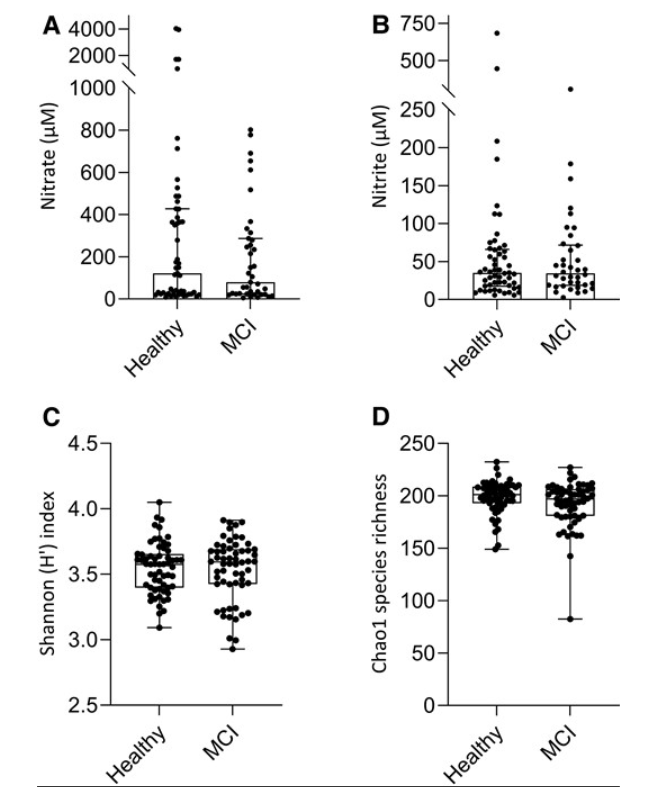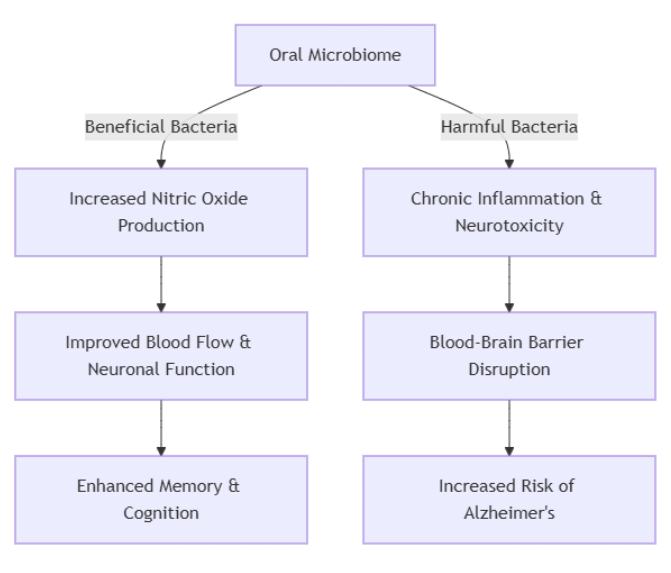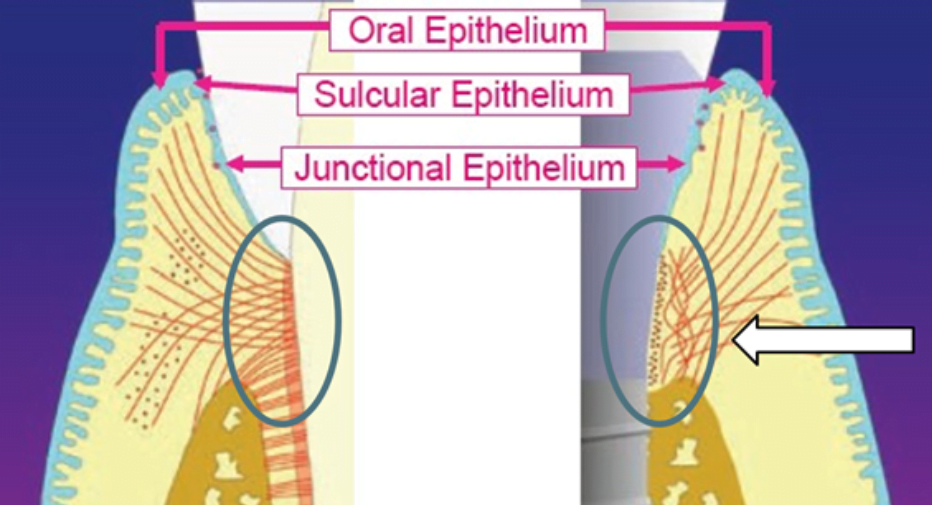Oral Bacteria and Cognitive Health: How Your Mouth Influences Brain Function
New research sheds light on the surprising connection between oral bacteria and cognitive health. Scientists have discovered that the microorganisms in our mouths may play a crucial role in brain function, memory, and even the risk of neurodegenerative diseases like Alzheimer’s.
Understanding this link could revolutionize preventive healthcare, highlighting the importance of oral hygiene not only for dental well-being but also for long-term cognitive function.
The Key Findings: What Scientists Discovered
A research team from the University of Exeter analyzed oral microbiomes from a group of older adults, comparing their bacterial composition with their cognitive abilities. Their findings were striking:
1. Beneficial Bacteria Can Boost Brain Health
Certain bacteria were associated with improved cognitive function, particularly:
- Neisseria and Haemophilus – These microbes were found in higher quantities in participants with better memory, attention, and cognitive flexibility.
- Nitrate-reducing bacteria – These bacteria help convert dietary nitrates into nitric oxide, which plays a key role in brain function by improving blood flow and neurotransmission.

Mouth rinse nitrate and nitrite concentrations and species diversity. The median mouth rinse nitrate (A) and nitrite (B) concentrations were not different between healthy and MCI groups. There were also no differences in median Shannon H′ index (C) or Chao1 species richness (D) between the healthy and MCI groups. Error bars in (A) and (B) indicate IQR. The box plots in (C) and (D) represent the median and IQR, while whiskers show the minimum and maximum values. Oxford Academic Pnas Nexus /Joanna E L’Heurexus /Volume 4, Issue 1, January 2025, page 543
2. Harmful Bacteria May Impair Memory and Cognition
On the other hand, some bacterial species correlated with cognitive decline, including:
- Porphyromonas – A well-known contributor to periodontal disease, this bacterium has also been linked to Alzheimer’s disease and cognitive impairment.
- Prevotella – High levels of this microbe were found in individuals with lower nitrate levels, potentially limiting the production of brain-protective nitric oxide.
These findings suggest that oral health may be an early warning sign of cognitive issues, opening new possibilities for preventive care strategies.
How Oral Bacteria Affect the Brain
The connection between oral health and cognitive function is complex, involving multiple pathways:
1. The Blood-Brain Barrier and Inflammation
Some harmful bacteria in the mouth can enter the bloodstream and travel to the brain. This can trigger chronic inflammation, damaging neurons and impairing brain function.
- Gum disease bacteria (like Porphyromonas gingivalis) produce toxins called gingipains, which have been detected in the brains of Alzheimer’s patients.
- Inflammatory molecules released by oral bacteria may weaken the blood-brain barrier, making the brain more vulnerable to infections and toxins.
2. Nitric Oxide and Blood Flow to the Brain
- Beneficial oral bacteria help convert dietary nitrates (from leafy greens and vegetables) into nitric oxide (NO), a molecule essential for:
- Vasodilation (widening of blood vessels), improving brain oxygenation.
- Neurotransmission, supporting memory and learning.
- If nitrate-reducing bacteria are disrupted (due to poor oral hygiene or antibiotic use), the brain may receive less oxygen and nutrients, leading to cognitive decline.
3. The Gut-Brain Axis
Oral bacteria don’t just stay in the mouth—they can influence the gut microbiome, which plays a key role in neurotransmitter production and mental health.
- An imbalance in oral bacteria can lead to dysbiosis (microbial imbalance) in the gut, affecting levels of serotonin, dopamine, and GABA, which are crucial for mood, memory, and concentration.
What This Means for Dental Professionals
This research has profound implications for dentists, periodontists, and oral health specialists. It suggests that dental care may be an important front line in preventing neurodegenerative diseases.
1. New Approaches to Routine Checkups
- Salivary bacterial analysis could become a screening tool for early cognitive decline.
- Monitoring nitrate-reducing bacteria may help assess a patient’s risk for brain health issues.
2. Personalized Preventive Strategies
- Probiotics and prebiotics targeting the oral microbiome may help support beneficial bacteria.
- Dietary recommendations (rich in leafy greens and polyphenols) could enhance nitric oxide production.
- Improved oral hygiene education—emphasizing flossing, antimicrobial rinses, and regular dental visits—could help maintain a healthy microbiome.
Study Overview and Methodology
Participants and Testing
- The study involved 110 participants over 50 years old, divided into two groups:
- Those with normal cognitive function.
- Those with mild cognitive impairment.
- Researchers collected oral rinse samples to analyze the participants’ microbial composition and compared these findings to neurocognitive test results.
Key Results
- Individuals with better cognitive function had higher levels of beneficial bacteria (Neisseria, Haemophilus).
- Participants with memory problems showed an overgrowth of harmful bacteria (Porphyromonas, Prevotella).
- The balance of oral bacteria correlated strongly with performance on memory, attention, and executive function tests.
Data Visualization: The Oral-Brain Connection
To better understand how oral bacteria influence brain function, consider the following flowchart:
This diagram shows how oral bacteria influence brain health via two major pathways:
✔ Beneficial bacteria support nitric oxide production, improving cognition.
✘ Harmful bacteria promote inflammation, increasing the risk of neurodegenerative diseases.
The Future of Dentistry and Brain Health
This research reinforces the growing interdisciplinary role of dental professionals in systemic health.
What Can Be Done?
✅ Encourage patients to maintain excellent oral hygiene to prevent bacterial imbalances.
✅ Incorporate microbiome screening into routine dental care, identifying at-risk individuals.
✅ Collaborate with neurologists and geriatricians to develop holistic strategies for preventing cognitive decline.
✅ Educate patients on dietary choices that support a brain-friendly oral microbiome.
Conclusion: A Paradigm Shift in Oral Healthcare
This study provides compelling evidence that oral health extends beyond the mouth, influencing brain function and long-term cognitive well-being.
For dentists and oral health specialists, this means that routine dental care could become a key factor in preventing neurodegenerative diseases. By monitoring and managing oral bacteria, healthcare professionals can contribute to not just healthier smiles, but healthier minds as well.
FAQs: Oral Bacteria and Brain Function
1. Can brushing and flossing really help prevent cognitive decline?
Yes! Good oral hygiene reduces harmful bacteria linked to inflammation and brain disease.
2. How can I boost beneficial bacteria in my mouth?
Consume nitrate-rich foods (leafy greens, beets), use probiotics, and avoid overuse of antimicrobial mouthwashes.
3. Should dentists start screening for cognitive health risks?
Salivary microbiome testing could become a valuable tool for early detection of cognitive decline.
4. Can periodontal disease increase Alzheimer’s risk?
Studies show that bacteria like Porphyromonas gingivalis are linked to brain inflammation and neurodegeneration.
5. What’s the best way to maintain a healthy oral microbiome?
A combination of good dental hygiene, diet, and regular check-ups is key to preserving both oral and brain health.
Sources
- ScienceDaily – Mouth bacteria may hold insight into your future brain function – February 5, 2025
- Oxford Academic Pnas Nexus – Oral microbiome and nitric oxide biomarkers in older people with mild cognitive impairment and APOE4 genotype – January 28, 2025








